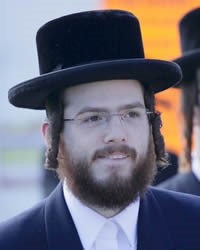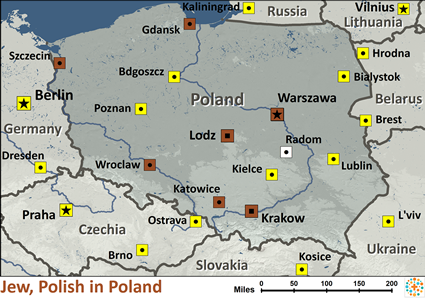Jews have lived in Poland for over 1,000 years. Throughout most of that time, Poland has been a center for Jewish culture. During the last few centuries, Eastern Europe had the largest Jewish population in the world. National attitudes toward the Jews were ambivalent, depending on the usefulness of the Jewish inhabitants to the nation's rulers. Anti-Semitism was prevalent and frequently led to either persecution or expulsion.
Poland was once the home of the largest concentration of Ashkenazi Jews in the world. The word Ashkenaz is derived from a biblical word for the larger Germanic region of Europe. Therefore, Ashkenazi Jews are those whose ancestry they link to that area. This group traditionally speaks the Yiddish language, which is a German dialect that has Hebrew and Slavic elements.
During World War II, when Germany occupied Poland, the Nazis had six concentration camps for Jews in that country. After WWII, Jewish families were often denied their own homes forcing many to leave the country. The new communist government offered no relief. For that reason, the Jewish population in Poland is small, even today.
After generations of persecution, Jews in Poland are now thriving. Though there continues to be anti-Semitism in Europe, synagogues are now functioning, and kosher (traditional, acceptable) food is once again available.
There are efforts to keep Jewish culture alive in Poland. They are opening Jewish schools, hospitals and retirement homes. Some are promoting Judaic studies in universities. Jewish community centers also promote cultural events such as the Israeli dance, theater, Yiddish and Hebrew lessons. In Poland there are Jewish publications including monthly magazines and a scholarly journal.
The Ashkenazic Jews are the most prevalent in Poland. They can be Orthodox, ultra-Orthodox, Conservative, or Reformed. The unusual and adamantly traditional Hasidic movement was born in Poland and has gained a strong following in the United States and Israel. Each Jewish denomination maintains synagogues and celebrates the traditional Jewish holiday calendar. While most European Jews are religiously affiliated, there is a significant minority which is not religious.
Orthodox Jews generally follow the traditional religious beliefs and practices found in the Jewish literature that interprets Scripture regarding ethical, religious, civil and criminal matters.
Reform Jews do not believe that the Jewish Law is revealed by God. They are not restricted to kosher foods. They neither wear the skullcap (yarmulke) when praying nor use Hebrew in prayer. All religious Jews believe in the coming of a Messianic Age, but only the Orthodox Jews look for a personal Messiah. They don't believe Jesus is the Messiah.
The Jews of Poland, like people everywhere, need to realize their need for a Savior. They believe the Old Testament is God's word, but do not realize Jesus fulfilled the many prophecies of the coming Messiah. They need to have their eyes, minds and hearts opened to the truth of God.
Ask the Lord to reveal the identity of his son to the Jews of Poland.
Pray for their understanding to be opened and for them to welcome and accept their messiah.
Pray for Messianic Jews in Poland to share their faith with other Jews. Pray for an unstoppable movement towards Jesus among Poland's Jewish population.
Scripture Prayers for the Jewish, Polish in Poland.
https://en.wikipedia.org/wiki/History_of_the_Jews_in_20th-century_Poland
https://www.myjewishlearning.com/article/jews-in-poland/
https://www.worldjewishcongress.org/en/about/communities/PL
| Profile Source: Joshua Project |

























